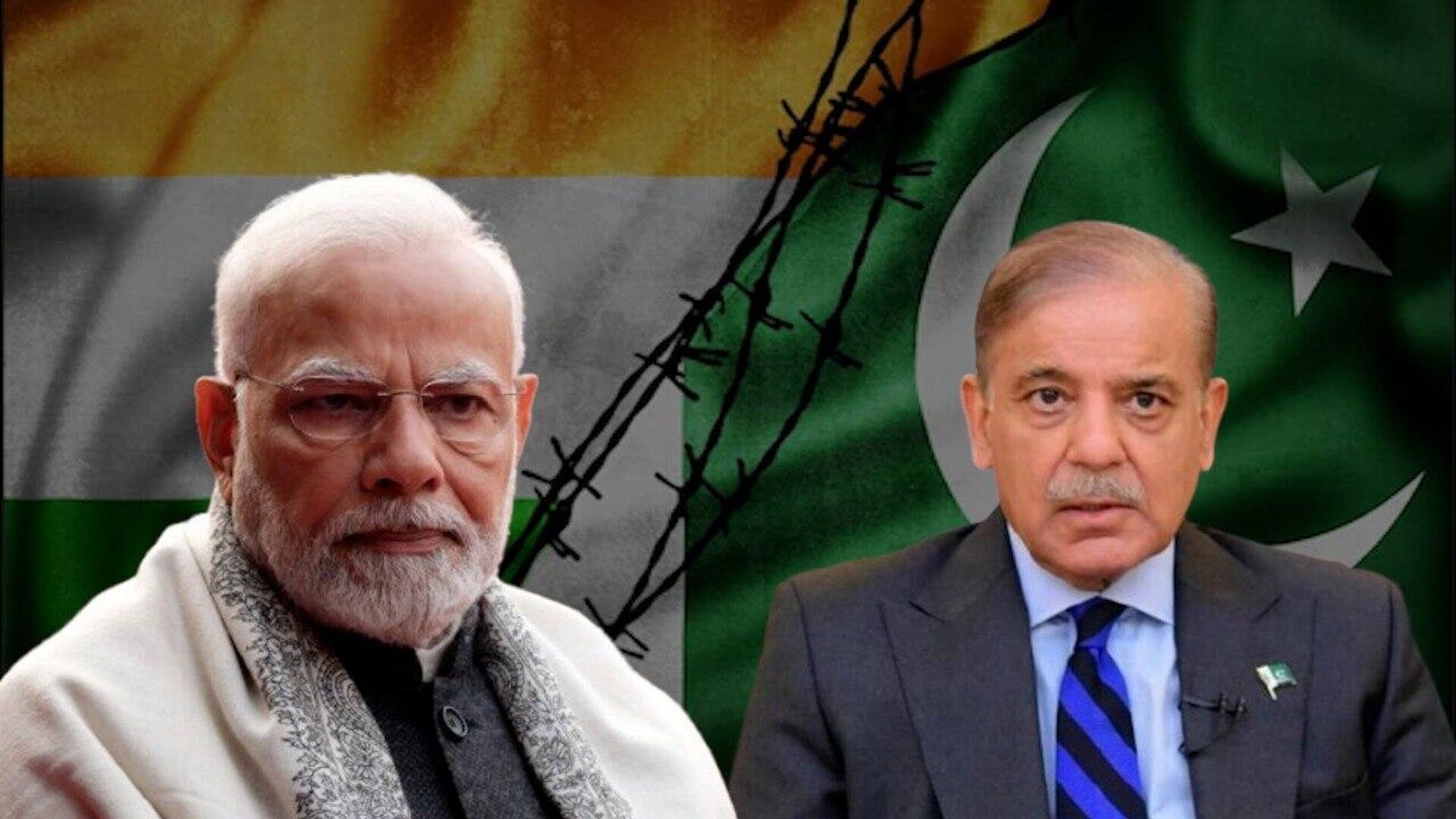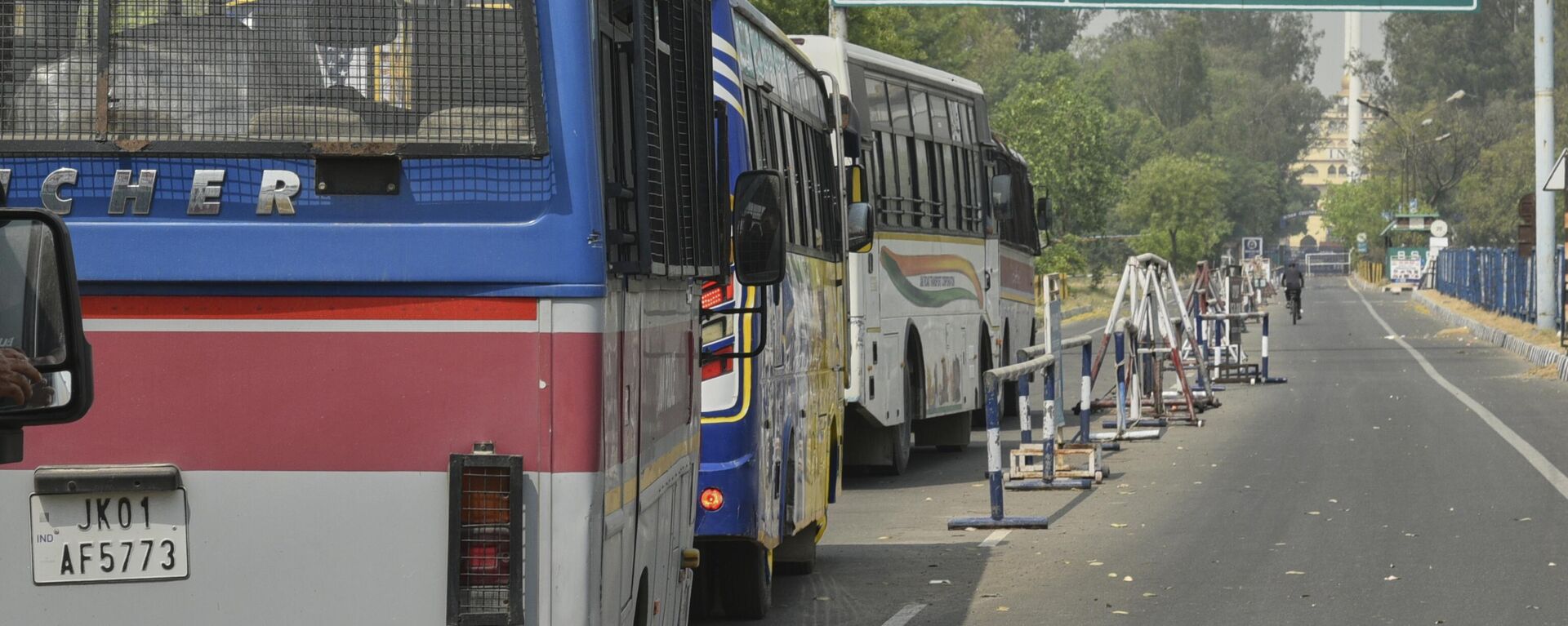https://sputniknews.in/20250505/india-rejects-pakistans-disinformation-campaign-alleging-state-sponsered-terrorism-9069314.html
India Rejects Pakistan’s 'Disinformation Campaign' Alleging State-Sponsored Terrorism
India Rejects Pakistan’s 'Disinformation Campaign' Alleging State-Sponsored Terrorism
Sputnik India
India has "taken note of fabricated evidence" presented by Pakistan which has consistently accused India of sponsoring terrorism on Pakistani soil, government sources have told Sputnik India.
2025-05-05T23:36+0530
2025-05-05T23:36+0530
2025-05-06T14:45+0530
pakistan
india
new delhi
un security council (unsc)
ministry of external affairs (mea)
g-20
terror charges
pahalgam terror attack
anti-terror laws
terror outfits
https://cdn1.img.sputniknews.in/img/07e9/04/18/9020531_0:0:1280:720_1920x0_80_0_0_488dbf07f297ddcec472803cbeaed478.jpg
India will be "exposing Pakistan's disinformation campaign” to the global community, including to the diplomatic corps in New Delhi, sources have said.India’s Ministry of External Affairs (MEA) has already briefed the envoys of G20 nations as well as the permanent members of the UN Security Council at the South Block in the wake of the Pahalgam terror attack.At the same time, External Affairs Minister (EAM) S Jaishankar has spoken to all the non-permanent and permanent members of the UNSC, barring Pakistan (currently a non-permanent member) and China.The development comes as "credible open source accounts" published a digital forensic report debunking allegations made by Director General of Pakistan's Inter-Services Public Relations (ISPR) Lieutenant General Ahmed Sharif Chaudhry, who told a press conference on 29 April that Pakistan had “complete and irrefutable evidence” showing India's role in "state-sponsored terrorism".Citing "forensic analysis and digital investigations," Chaudhry claimed that "Indian-trained" Abdul Majeed was arrested by Pakistani agencies on 25 April after being "handled" by serving Indian Army officers.Chaudhry claimed that Pakistani agencies had recovered cash, an "Indian-made drone" and explosives from Majeed, claiming that he was involved in at least one IED-triggered blast that led to the deaths of four Pakistani soldiers on 30 November. The Pakistan Army's media wing presented screenshots of a WhatsApp conversation to back up its claims. At a press conference on 30 April, Pakistan's Deputy Prime Minister and Foreign Minister Ishaq Dar invited independent experts to verify these claims.The report, published on Sunday evening, accused Pakistani agencies of employing "doctored screenshots" and having "timeline anomalies" in the digital evidence shared at the presser on 29 April.At the outset, the study called out Pakistan’s ISPR for conducting a "forensic investigation" on a live, active phone with dual SIMs.Further, the study questions how Pakistan could produce call logs from the suspect from almost a year ago.The digital forensic experts also questioned whether Pakistani agencies themselves planted the malware on Majeed’s phone in the first place, adding that if that were the case, then Pakistan would have known about the whereabouts of the suspect all along.Further, open-source accounts have also questioned the "timing" of the screenshots shown to media by the ISPR on 29 April.Further, ISPR Monitor pointed out that the alleged handler, codenamed 'Shaknder', was seen online when the ISPR was taking screenshots of the chat.Then, these OSINT accounts have also raised doubts over Pakistan’s claim that the Indian handlers transferred over 100,000 Pakistan Rupees (PKR) to the man in payments.The report has also questioned how Pakistan could figure out if the handler was actually a serving Indian Army officer, or even a veteran.Further, citing the voice samples presented at the Pakistani presser, the study questions the use of Hindi and Urdu during conversations, even though the original conversation was in Punjabi.Importantly, it has been pointed out that DG ISPR's reference to Balochistan during the presser was unwanted and an "eyewash" to falsely implicate India, even though the captured terrorist's activities centered around the Punjab province.
https://sputniknews.in/20250503/india-bans-import-transit-of-goods-from-pakistan-9063264.html
pakistan
india
new delhi
balochistan
Sputnik India
feedback.hindi@sputniknews.com
+74956456601
MIA „Rossiya Segodnya“
2025
Dhairya Maheshwari
https://cdn1.img.sputniknews.in/img/07e6/0c/13/138962_0:0:641:640_100x100_80_0_0_2cb44360dbcdf6d84bf4b299cd045917.jpg
Dhairya Maheshwari
https://cdn1.img.sputniknews.in/img/07e6/0c/13/138962_0:0:641:640_100x100_80_0_0_2cb44360dbcdf6d84bf4b299cd045917.jpg
News
en_IN
Sputnik India
feedback.hindi@sputniknews.com
+74956456601
MIA „Rossiya Segodnya“
Sputnik India
feedback.hindi@sputniknews.com
+74956456601
MIA „Rossiya Segodnya“
Dhairya Maheshwari
https://cdn1.img.sputniknews.in/img/07e6/0c/13/138962_0:0:641:640_100x100_80_0_0_2cb44360dbcdf6d84bf4b299cd045917.jpg
terrorism in pakistan, india pakistan war, india pakistan news, pahalgam terrorist attack, isi chief, pakistan army, india pakistan news, pakistan news, indus water treaty
terrorism in pakistan, india pakistan war, india pakistan news, pahalgam terrorist attack, isi chief, pakistan army, india pakistan news, pakistan news, indus water treaty
India Rejects Pakistan’s 'Disinformation Campaign' Alleging State-Sponsored Terrorism
23:36 05.05.2025 (Updated: 14:45 06.05.2025) India has "taken note of fabricated evidence" presented by Pakistan to accuse India of sponsoring terrorism on Pakistani soil, government sources have told Sputnik India.
India will be "exposing Pakistan's disinformation campaign” to the global community, including to the diplomatic corps in New Delhi, sources have said.
India’s
Ministry of External Affairs (MEA) has already briefed the envoys of
G20 nations as well as the permanent members of the UN Security Council at the South Block in the wake of the
Pahalgam terror attack.
At the same time, External Affairs Minister (EAM) S Jaishankar has spoken to all the non-permanent and permanent members of the UNSC, barring Pakistan (currently a non-permanent member) and China.
The development comes as "credible open source accounts" published a digital forensic report debunking allegations made by Director General of Pakistan's Inter-Services Public Relations (ISPR) Lieutenant General Ahmed Sharif Chaudhry, who told a press conference on 29 April that Pakistan had “complete and irrefutable evidence” showing India's role in "state-sponsored terrorism".
Citing "forensic analysis and digital investigations," Chaudhry claimed that "Indian-trained" Abdul Majeed was arrested by Pakistani agencies on 25 April after being "handled" by serving Indian Army officers.
Chaudhry claimed that Pakistani agencies had recovered cash, an "Indian-made drone" and explosives from Majeed, claiming that he was involved in at least one IED-triggered blast that led to the deaths of four Pakistani soldiers on 30 November. The Pakistan Army's media wing presented screenshots of a WhatsApp conversation to back up its claims. At a press conference on 30 April, Pakistan's Deputy Prime Minister and Foreign Minister Ishaq Dar invited independent experts to verify these claims.
A study by Digital Lab Voyager Infosec, a New Delhi-based digital forensics firm, and ISPR Monitor, an OSINT account, have described Pakistan's allegations and evidence as a "staggering array of forgery, fabrication and invented stories".
The report, published on Sunday evening, accused Pakistani agencies of employing "doctored screenshots" and having "timeline anomalies" in the digital evidence shared at the presser on 29 April.
At the outset, the study called out Pakistan’s ISPR for conducting a "forensic investigation" on a live, active phone with dual SIMs.
"The basic rule of digital forensics is use of cloned, non-active devices to preserve data integrity. ISPR’s forensic investigation was conducted on a live, active phone with dual SIMs. This alone should have disqualified the entire exercise," it said.
Further, the study questions how Pakistan could produce call logs from the suspect from almost a year ago.
"Given the education level of terrorists, it is impossible for him to install specific apps for WhatsApp voice/call recordings. And why would he do that? Maybe he kept call recordings for ISPR to find out," it noted.
The digital forensic experts also questioned whether Pakistani agencies themselves planted the malware on Majeed’s phone in the first place, adding that if that were the case, then Pakistan would have known about the whereabouts of the suspect all along.
Further, open-source accounts have also questioned the "timing" of the screenshots shown to media by the ISPR on 29 April.
"Every screenshot was taken immediately after a message had been sent! ISPR says Majeed was arrested on April 25, so how did they manage to time travel into the past to take screenshots?" ISPR Monitor asked.
Further, ISPR Monitor pointed out that the alleged handler, codenamed 'Shaknder', was seen online when the ISPR was taking screenshots of the chat.
Open source accounts have also raised doubts over the claim that the drone recovered from the terrorist was "Indian-made".
Then, these OSINT accounts have also raised doubts over Pakistan’s claim that the Indian handlers transferred over 100,000 Pakistan Rupees (PKR) to the man in payments.
"The alleged Indian handler claims he would not deposit more than 10,000 PKR into the terrorist’s account to avoid the ISI, but eventually he starts paying him 100,000 PKR in account! What’s even more bizarre, the Indian officers use Pakistani online payment gateways to transfer money, that too multiple accounts, conveniently creating trails so that DG ISPR could do a presentation," the study says.
The report has also questioned how Pakistan could figure out if the handler was actually a serving Indian Army officer, or even a veteran.
"They couldn’t show a single Indian number, call metadata, ISP logs; or contact trail proving communication with India," it said, adding that the ISPR had even failed to identify the "ex-Indian Army officer" who was shown on screen during the 29 April presser.
Further, citing the voice samples presented at the Pakistani presser, the study questions the use of Hindi and Urdu during conversations, even though the original conversation was in Punjabi.
Importantly, it has been pointed out that DG ISPR's
reference to Balochistan during the presser was unwanted and an "eyewash" to falsely implicate India, even though the captured terrorist's activities centered around the Punjab province.



